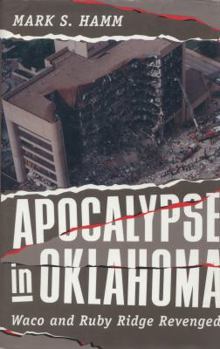Apocalypse in Oklahoma: The Transformation of Personal Religious Experience in Nineteenth-Century New England
In a work that is sure to stir controversy, Hamm convincingly argues that the force used by the FBI during the sieges at the Branch Davidian compound in Waco, Texas, and at Randy Weaver's cabin in... This description may be from another edition of this product.
Format:Hardcover
Language:English
ISBN:1555533000
ISBN13:9781555533007
Release Date:January 1997
Publisher:Northeastern University Press
Length:352 Pages
Weight:1.55 lbs.
Dimensions:1.1" x 6.4" x 9.6"
Customer Reviews
2 ratings
Wonderful Discovery
Published by Thriftbooks.com User , 23 years ago
I must admit that I was late to discover this book. What a pleasant surprise. Dr. Hamm presents important and insightful facts into the terrible crime that far too many researchers overlooked. History will treat this book well. It is a must read for any person who wants to understand the motivations behind McVeigh and his "brotherhood." JD Cash
Contributes to sorting through the rubble of civil disorder
Published by Thriftbooks.com User , 26 years ago
Highly worth reading to better understand the dynamics of terrorism, politics, and injustice in America. Yet, the rubble and confusion left in the wake of the assaults upon Ruby Ridge and Waco as well as the bombing of the Murrah Building remain an inadequately explained, interdependent set of critical incidents. Professor Hamm offers a useful but incomplete explanation of the bombing of the Murrah Building. He fails to offer anything approaching a viable explanation of how some high ranking federal law enforcement authorities could have made such undemocratic and administratively poor judgments as plainly occurred at Ruby Ridge and Waco. Nor does Professor Hamm adequately address the question of why President Clinton and Attorney General Janet Reno found themselves supporting such poor and unconstitutional use of force policies and actions. It also is highly problematic that the bombing of the Murrah Building was our nation's greatest act of terrorism. That issue needs further study and clarification in the empirical light of our nation's abusive and terroristic treatment of Native Americans and African Americans. Kelman and Hamilton's (1989) book, "Crimes of Obedience: Toward a Social Psychology of Authority and Responsibility," could help Professor Hamm put these pieces of the justice puzzle and bureaucratic mismanagement into a more meaningful conceptual framework that would better address our nation's democratic and constitutional values. Additional clarity could be achieved by exploring the fact that neither the disciplines of criminology nor criminal justice have achieved anything approaching an adequate consensual definition of the meaning of "justice" or of the mission of "criminal justice." In effect, the most critical shortcomings of Professor Hamm's study are rooted not in his inadequacy but in the neophyte professional status of criminology and criminal justice as academic disciplines (neither of which, incidentally, has a functional code of research ethics). Both disciplines are a long way from understanding how to sort through the ruins from Ruby Ridge, Waco, or the Murrah Federal Building in Oklahoma City. For example, despite supporting evidence from social psychology, neither discipline emphasizes the importance of procedural justice and the contribution that it can make to the rule of law (see Tom Tyler et al., 1997, "Social Justice in a Diverse Society). Despite some steps, neither discipline emphasizes the value of prosocial values (see one of the exceptions, John Fuller, 1998, "Criminal Justice: A Peacemaking Perspective"). Neither disicpline adequately addresses the moral implications of developmental psychology and neurobiology (see Daniel Goleman, 1995, "Emotional Intelligence: Why It Can Matter More Than IQ"; May, Friedman, & Clark (Eds.), 1996, "Mind and Morals: Essays on Cognitive Science and Ethics"). At the end of the last chapter Professor Hamm focuses upon the important role played by volunteers and religious





